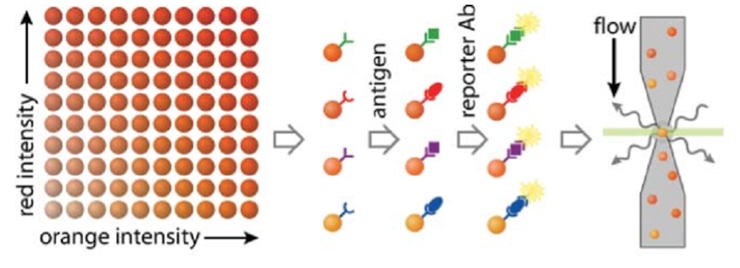CD Bioparticles launches Beads Based Multiplex Assay services for preclinical and clinical research.
(PRUnderground) July 21st, 2025

With years of experience in the pharmaceutical and life science sectors, CD Bioparticles has announced the launch and expanded availability of its cutting-edge Beads Based Multiplex Assay services for researchers to simultaneously measure up to 500 analytes from a single sample, significantly enhancing the efficiency and precision of preclinical and clinical research.
Measuring soluble cytokines and other analytes in serum and plasma is becoming increasingly important in studying and treating many diseases. Consequently, there is a growing need for the rapid, accurate, and cost-effective measurement of these analytes in clinical and research laboratories. Multiplex bead array assays use an automated 96-well plate format to quantify large numbers of analytes. Although enzyme-linked immunosorbent assays (ELISA) are the standard for the quantitative analysis of cytokines and other biomarkers, they are not suitable for high-throughput, multiplexed analysis.
CD Bioparticles now offers researchers customized multiplex assays based on Luminex xMAP technology. The CD-Multiplex bead-based multiplex system can detect up to 500 analytes in a single sample, meeting the needs of preclinical and clinical research. The system allows scientists to use a smaller sample volume in a high-throughput format, making it easier and more efficient to obtain accurate results.
bead-based multiplex system can detect up to 500 analytes in a single sample, meeting the needs of preclinical and clinical research. The system allows scientists to use a smaller sample volume in a high-throughput format, making it easier and more efficient to obtain accurate results.
The CD-Multiplex system uses magnetic beads modified with unique fluorophores of varying intensities. Individual magnetic beads are distinguished from others by unique numbering, and each group of beads is conjugated to a custom antibody that detects a specific analyte. Multiple color-coded, antibody-conjugated beads are added to a single well of a microtiter plate, enabling the simultaneous detection of multiple analytes in a sample. This CD-Multiplex
system uses magnetic beads modified with unique fluorophores of varying intensities. Individual magnetic beads are distinguished from others by unique numbering, and each group of beads is conjugated to a custom antibody that detects a specific analyte. Multiple color-coded, antibody-conjugated beads are added to a single well of a microtiter plate, enabling the simultaneous detection of multiple analytes in a sample. This CD-Multiplex assay undergoes stringent quality control and validation to ensure its reliability and specificity.
assay undergoes stringent quality control and validation to ensure its reliability and specificity.
CD Bioparticles’ multiplex cytokine assay solutions are widely used in various fields, including immunology, oncology and drug development. For example, they’re essential tools for oncology, which enables the detection of markers in tumor environments and the evaluation of treatment effectiveness. Additionally, they are used in toxicology to assess toxicity biomarkers during drug candidate evaluation. They also play a key role in vaccine development by profiling vaccine-induced immune responses. Furthermore, CD Bioparticles’ multiplex bead array assays facilitate translational studies by integrating in vitro, ex vivo, and in vivo biomarker data.
CD Bioparticles’ custom Luminex bead-based multiplex assay services support all phases of a research project, from panel design, bead conjugation, validation, testing to data delivery. For example, CD Bioparticles offers the Robust Cross-reactivity Validation service through careful optimization of each antibody-bead conjugate to ensure specificity. With flexible panel sizes ranging from two to 500 analytes, CD Bioparticles can support researchers whether they’re validating a few biomarkers or profiling an entire proteome. In addition, CD Bioparticles performs comprehensive quality control on every custom multiplex bead-based immunoassay to ensure sensitivity, specificity, dynamic range, and reproducibility.
To learn more about CD Bioparticles’ custom Bead-Based Multiplex Assay services, please visit https://www.cd-bioparticles.com/s/Beads-Based-Multiplex-Assay_29.html.
About CD Bioparticles
CD Bioparticles specializes in manufacturing and supplying nanoparticles, microparticles, and coatings for diagnostics and research, alongside developing customized, biocompatible drug delivery systems. We offer diverse formulation technologies (from liposomes to polymer nanoparticles) and comprehensive services, including surface functionalization, antibody immobilization, and contract research for drug delivery.
The post CD Bioparticles Launches Beads Based Multiplex Assay for High-Throughput Biomarker Detection first appeared on
Original Press Release.






